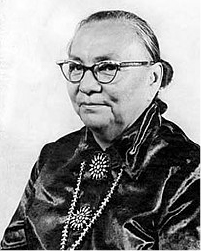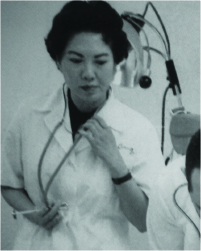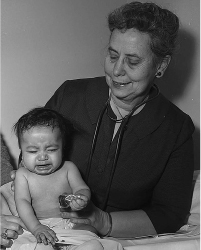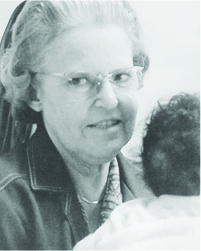
Honoring Arizona women who have provided healing and promoted health
Every March, the U.S. celebrates Women’s History Month to honor women’s contributions to history, culture and society. This year’s theme, “Women Providing Healing, Promoting Hope,” set by the National Women’s History Alliance, recognizes frontline workers, caregivers and the many ways women of all cultures have provided healing and hope throughout history.
In honor of Women’s History Month and in accordance with this year’s theme, the ASU Graduate College has highlighted four pioneer women in Arizona’s history.
Annie Dodge Wauneka (1910 – 1997)

Annie Dodge Wauneka, born into the Tse níjikíní (Cliff Dwelling People) Clan of the Diné (Navajo) Tribe, was a tribal leader and public health activist. She was a child when the Spanish Influenza struck and helped to care for others after surviving the flu herself. Wauneka went on to study public health and was the second woman elected to the Tribal Council in 1951.
Wanueka created an English-Navajo medical dictionary to help doctors and patients communicate, gave weekly radio broadcasts in Navajo to explain health and medicine information and served on the advisory boards of the U.S. Surgeon General and the U.S. Public Health Service. In 1963, she received the Presidential Medal of Freedom.
Pearl Mao Tang (1922 – 2021)

Pearl Mao Tang was an Arizona physician and staunch advocate for women’s health. Tang was the first Asian woman doctor licensed in Arizona. She started prenatal clinics in the 1950s to address the high infant mortality rate at the time and started a program that screened women for uterine cancer. Tang also championed legislation that required all schoolchildren to be vaccinated. The sponsor of the bill was Sandra Day O’Connor.
Florence Brookhart Yount (1909 – 1988)

Florence Brookhart Yount is recognized as Prescott’s first woman physician. She established a well-baby clinic, which focuses on the overall wellbeing of infants, and led the movement to reopen a community hospital in Prescott, which later opened March 1, 1943. Yount primarily practiced prenatal care and obstetrics, delivering entire families and subsequent generations.
Kathleen Clark (1919 – 2003)

Sister Kathleen Clark established the first child crisis nursery in the U.S., Casa de los Niños, in Tucson in 1973. She wanted to open a safe haven for neglected and abused children after seeing victims of child abuse during her time as a nurse at St. Joseph's Hospital in Tucson. Since it opened, over 30,000 children have stayed at Casa de los Niños.
ASU is hosting a variety of events to commemorate Women’s History Month, also known as “Women’s HERstory Month.” Visit the events webpage for the full schedule of events.
More stories from the Graduate Insider

Graduate education is an adventure
About eighteen months ago, I set out on a journey walking the islands of the Dodecanese during a sailing trip in Türkiye and Greece with several friends. Along the way, I found winding paths, timeless villages and breathtaking views of sea and sky. That experience got me thinking about how adventure shows up in other parts of life, especially in learning.

Finding your flow: Managing the graduate writing process
Graduate writing can feel like a marathon—long, demanding, and full of unexpected detours. But as Tristan Rebe, Program Manager for the Graduate Writing Center, reminded students in the Grad15: Managing the Writing Process webinar, writing is not about perfection—it’s about progress. “The best dissertation is a done dissertation,” Rebe said, quoting Robert Frost: the best way out is through.
